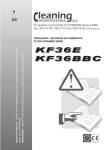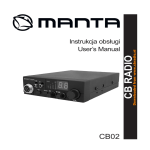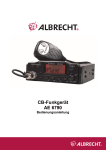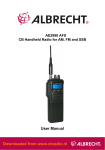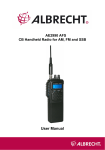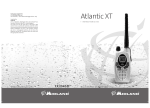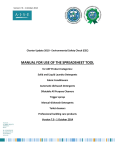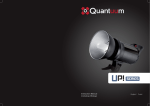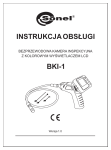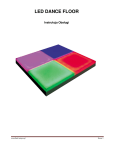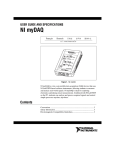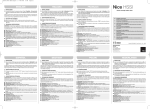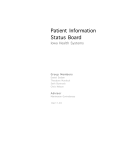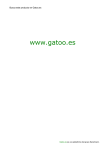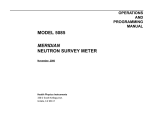Download CB Radio AE 6891
Transcript
CB Radio AE 6891 Instrukcja obsługi Spis treści Wstęp ................................................................................ Błąd! Nie zdefiniowano zakładki. Zawartość opakowania....................................................................................................... 3 Instalacja radia ................................................................................................................... 4 Zasilanie............................................................................................................................. 5 Zasilanie w samochodzie ................................................................................................... 5 Bezpiecznik na kablu zasilającym ...................................................................................... 5 Zasilacz 230V..................................................................................................................... 6 Podłączenie anteny i tylny panel ........................................................................................ 6 Zalecenia producenta samochodu ..................................................................................... 7 Aspekty prawne ..................................................................................................................... 7 Wymogi bezpieczeństwa .................................................................................................... 7 Obsługa ................................................................................................................................. 8 Panel przedni ..................................................................................................................... 8 Programowanie standardu .................................................................................................... 8 Najważniejsze funkcje ......................................................................................................... 10 AE 6891 Odbiór ............................................................................................................... 10 Włącz / Wyłącz ............................................................................................................... 10 Siła głosu ......................................................................................................................... 10 Wybór kanału ................................................................................................................... 10 Ustawienie blokady szumów (Squelch) ............................................................................ 10 Używanie automatycznej blokady szumów Automatic Squelch ........................................ 10 AE 6891 Nadawanie ............................................................................................................ 11 Funkcje dostępne z przedniego panelu ............................................................................ 11 Przyciski po lewej stronie ................................................................................................. 11 Przyciski pod wyświetlaczem ........................................................................................... 12 Przyciski po prawej stronie ............................................................................................... 13 Wybór modulacji: AM czy FM? ......................................................................................... 13 Przyłącza zewnętrzne .......................................................................................................... 14 Gniazdo mikrofonowe MIC ............................................................................................... 14 Głośnik zewnętrzny .......................................................................................................... 14 Gwarancja ........................................................................................................................ 15 Zużyty sprzęt i recykling ................................................................................................... 15 Szybki przewodnik obsługi AE 6891 .................................................................................... 17 Deklaracja zgodności / Konformitätserklärung .................................................................... 18 2 Wprowadzenie Gratulujemy zakupu radia CB Albrecht AE 6891. Ten radiotelefon CB skonstruowany jest z użyciem najnowocześniejszych technologii używanych przy produkcji sprzętu radiokomunikacyjnego, dlatego można używać go we wszystkich krajach UE (oprócz Austrii, gdzie do czasu wejścia w życie nowych unijnych przepisów, dopuszczona jest tylko specjalnie programowana wersja FM ). Możesz łatwo wybrać standard używany w państwie, na terytorium którego aktualnie przebywasz. Prawo Unii Europejskiej pozostawia państwom członkowskim znaczną swobodę w wyborze mocy, częstotliwości I rodzajów emisji w paśmie CB. Radzimy dokładnie zapoznać się z regulacjami obowiązującymi w miejscach, gdzie radio ma być używane i korzystanie wyłącznie z dozwolonych standardów. Nowy Albrecht AE 6891 oferuje • 40 kanałów FM / 4 waty, 40 kanałów AM / 1 wat (programowane 40/40 EU) • 80 kanałów FM / 4 waty, 40 kanałów AM / 1 wat (programowane 80/40 dE) • • • 40 kanałów FM / 4 waty (programowane 40 FM / fabryczne ustawienie Austria EC) 40 channels FM / 4 Watts, plus 40 channels AM, 4 Watt (programming for Poland Po) 40 channels FM / 4 Watts, plus 40 channels AM, 4 Watt (programming for Spain E) The settings E and Po correspond already with the new CEPT standard CEPT/ECC DEC 11 (03) and ETSI EN 300 433-2 • • • • • • • • • • 40 channels FM / 4 Watts (programming 40 FM for UK U) Channel selection with rotary knob on the radio + up/down buttons on the microphone Detachable front panel for separate installation and microphone jack Large LCD display for channel, frequency, status, power and S meter display with inverted display (white letters, dark background) 6-pin microphone jack on control panel according to Albrecht standard for any microphone, even for data transmission and gateway operation External speaker jack External S meter jack Scan, dual watch monitoring and 4 programmable memory channels EEPROM Flash memory for saving the last setting – no loss of data due to power failure Direct change of country setting during operation Versions for certain countries with other features (e.g. for Austria without country selection AE 6891 FM) available on request and/or can be modified by authorized dealers for the respective country. Scope of Delivery Your AE 6890 comes ready to use with the following accessories: • • • • • Mobile holder for unit and separate installation material for front panel Hand microphone Bracket for hand microphone Plug-in DC cable – in-line fuse Detached operation via 9-pin Sub-D cable (approx. 2m length) supplied incl. screws (installation accessories) 3 • User manual with Radio Passport Radio Installation You can operate your AE 6891 in the car or as a base station at home. For installation as a mobile station in the car a mobile holder and a variety of installation materials are included. Do not install the device in direct sunlight, since the increased temperature can shorten the lifecycle of the device. Do not install in close proximity to a heater. Install the device in such way that it is not subjected to major vibration. Install the mobile holder with the included self-tapping screws on dashboard, chassis tunnel or in other suitable location. Do not install the device in areas where it can cause injuries due to accident (observe sufficient legroom). Ensure not to damage existing cables during installation! Slide the radio into the mobile holder. Fix the device with the large knurled screws (use the included plastic washers!) in the desired view angle. Detach the front panel (loosen 2 screws at the bottom) if installation of the complete unit is not possible and install the radio separate from the control panel. Install the microphone bracket with the included screws in an easy to reach location. For detached installation use the included approx. 2m long 9-pin Sub-D cable. Side view detached control panel. Fix the cable with the screws after installation! The installation material includes the two screws for the plug if not already attached to the cable. 4 Power Supply Power supply via the 2-pole plug-in cable, which is equipped with in-line fuse holder. Operate the radio in vehicles (12V) or as base station via suitable 12V power adaptor (at least 2A, stabilized). Vehicle Power Connection Connect the red power cable to the positive terminal (i.e. a point within the vehicle wiring with 12V supply power) and the black cable to the negative terminal. We strongly recommend connecting the radio directly to the battery. Generally direct connection supplies the most stable operating voltage and optimum protection against interferences during reception and transmitter modulation. Modern vehicle wiring is so complex that connecting to other points (such as car radio terminals or cigar lighter) can lead to interferences. These can be heard as “singing” or crackling during reception, in some persistent cases also during transmission as “alternator noise”. If you cannot connect directly to the battery, as recommended, try the best possible connecting point before final installation. Start the engine to check if the selected connection causes reception or transmission noise by ignition or alternator. In case persistent noise from the onboard network cannot be resolved, have the service install our DC noise filter (order no. 70600). To automatically turn off the radio when turning off the ignition, connect to the switched voltage at the ignition switch. Our AE 6891 features continuous Flash EEPROM memory of the last setting and starts with the setting used last upon turning on the ignition again. The last setting is not deleted, even if the radio is disconnected from power supply for a longer period of time. Radio ground connection (negative): Connect the black cable to the negative battery terminal or to a proper GND point on the engine lock or a central GND connector in the vehicle. Avoid ground connection via selftapping screws to the bodywork. This is not a robust connection and frequently causes malfunction. Importance of the Fuse in the Power Cable The in-line fuse protects your radio from serious damage due to technical defects or incorrect connection. A fuse does not blow without reason. In most cases this is due to incorrect polarity and the internal protective diode has responded. During a short circuit inside the device the fuse blows to prevent serious damage. Determine and eliminate the cause if a fuse blows, then exchange the fuse with a similar one (use fuses up to 5A). Never repair a blown fuse with silver paper or tin foil! Return your radio to your dealer or an authorized service partner in case the fuse blows repeatedly. Notes Especially for Truck and RV Drivers The permissible operating voltage of the radio can vary, according to the standard, between 10.8 and 15.6V, without the radio’s performance values changing. The transmission stages of your AE 6891 are electronically stabilized. Output increase by excessive operating voltage is thus impossible. This can only lead to serious defects, but not to output increase! Truckers must ensure never to connect the radio directly to 24V. For 24V a suitable voltage converter 24V to 12V is necessary. Since trucks mostly have voltage converters already installed for 5 other devices such as mobile phone, TV, car radio the power consumption of the CB radio should be calculated with approx. 1.5 to 2A. Although especially compact and low-loss switching converters with CE mark are interference-suppressed according to EU regulations for “normal” vehicle electric consumers such as car radios, cooler boxes or coffee machines, this frequently is not sufficient for undisturbed CB reception, since CB radios feature highly sensitive receivers. We cannot guarantee flawless CB reception during switching converter operation and in vehicles with board computers. Problems cannot be avoided in all cases without trials. It is also important that the aerial is located as far away from other aerials and from the converter wiring as possible and has a good grounding surface. Contrary to mobile phone and car radio antennas conventional CB aerials cannot be installed on plastic surfaces, unless a metal foil is at the bottom side. Ground connection is especially important for CB radios. In case the truck still has a metal mirror holder, the foot can be attached here with an angle mount, but not e.g. on a pure GRP roof or GRP spoiler. If the antenna cannot be installed on a conductive surface, our floating ground CB mobile antennas such as GL 27 are available. 230V Operation via Power Adaptor In case you operate your radio at home, use a specially stabilized CB radio power adaptor to supply at least 1.5-2A at 12-13.8VDC. A suitable power adaptor is the Albrecht order no. 4744. Non-stabilized power adaptors, battery chargers or popular cooler box adaptors are not suitable for CB radio and should not be used. Switching power adaptors can only be used in connection with an external antenna for CB radio, which does not receive the interferences of these power adaptors. Connect the positive cable (red) to the positive terminal (+) of the power adaptor, the black cable to the negative terminal (-) of the power adaptor. Antenna Connection – Rear Antenna (PL259) Ext. speaker Ext. S meter 12VDC cable Connect your CB antenna via PL connector to the 50 Ohms antenna jack at the rear of your AE 6891. For best range the antenna must be adjusted for CB radio. Use a standing wave meter to check and to adjust the antenna. Adjust the antenna for best standing wave ratio on a medium channel. If you are using 80 channels optimize on channel 1, for 40 channels on channel 20 and for truckers we generally recommend channel 9. On this channel you should achieve a standing wave ratio of approx. 1.5 or less. Even if the standing wave ratio on the highest (channel 40) and lowest channel (1 or 41) deteriorates up to 2, your antenna is still suitable. If the standing wave meter shows a value in red (SWR > 3), already more than 25% of the transmission power is lost due to modulation losses. Poor SWR can also be a sign for a defective antenna, cable or short-circuit in the antenna connector! Otherwise optimize your antenna on the channel you use most. Dealers also offer broadband antennas such as Gamma II, where no adjustment is necessary. Your dealer offers inexpensive standing wave meters such as the Albrecht SWR 30, order no. 4412. 6 By the way: Even with your AE 6891 featuring an especially robust final stage, which can even cope with maladjustments of SWR = 3, you should never transmit without antenna! Vehicle Manufacturer Installation Instructions When installing a radio in a vehicle always observe the instructions of truck and car manufacturers. Vehicle manufacturers have the right, according to applicable EU directives, to stipulate antenna installation locations and the maximum compatible transmission power for their vehicles. Observe these specifications under all circumstances not to risk to forfeit the operating license for your vehicle. Information is available from the vehicle manufacturers. If in doubt, have the vehicle manufacturer certify that no reservations against CB radio operation in connection with the vehicle electronics exist. Legal Notices This device features the marking according to R&TTE directive: The CE mark means that the radio satisfies all technical regulations applicable to the product within the scope of EU Council directives, European standards and national frequency applications. The so-called R&TTE directive replaces all previous national “certifications” within the EU and regulates also marketing and use of radio equipment. Accordingly ownership of and retail with properly marked devices such as the AE 6891 within the EU and some other (non-EU) countries recognizing the R&TTE directive, is permitted, while for the use of radio equipment depending on programming and country temporarily different regulations apply. For CB radio this means: although technical standards EN 300 135 and EN 300 433 apply Europe-wide, the use of certain modulation modes and channel numbers do not. For this reason there are still differences in the channel number programming for AM and FM, and some countries still charge fees for CB radios. All radios, for which somewhere in Europe still limitations exist are therefore marked with an “attention mark” (see above) besides the CE mark. The manufacturers are bound to inform users clearly on the packaging what to observe while using the devices. This is insofar comprehensible, since frequencies, which earlier were approved in the different countries for different purpose, cannot easily be uniformly reassigned. The new CB standards were adopted in May / June 2011 by CEPT and published as European decision ECC/DEC11(03). It can still take some time until they are adopted by all countries. AE 6891 satisfies the harmonized European radio standards EN 300 433-2 and EN 300 1352 for CB radios, as well as EN 301 489-13 for electro-magnetic compatibility and EN 60 9501: 2006 for electric safety. The device does not transmit harmful radio interferences and is on the other hand irradiation-resistant when used according to this user manual. This is generally the case when cables not longer than 3m are connected to the microphone and speaker jacks. Safety Precautions Electro-magnetic waves as transmitted by broadcasters, mobile phones and radios can affect other sensitive electronic devices in their immediate vicinity. As a precaution we recommend for persons with pacemakers to collect information with respect to the interference immunity of their pacemakers before operating a CB radio for the first time. Although in most cases the CB radio output is quite safe, no harm is done to talk to your physician first. Please note that you are in the immediate proximity of the transmission antenna, especially during mobile operation. Please keep safety distances if they are recommended by your physician or by the pacemaker’s manufacturer! Do not transmit without the antenna connected and never touch the antenna during transmission! During vehicle operation traffic safety is the absolute priority! 7 Even if radio operation such as your CB radio in Germany is exempt from the so-called “mobile phone ban”, and you may use your AE 6891 while driving, only reach for the microphone when the traffic permits! Please note that in many other countries no exceptions are made for CB radios. As the driver you are not permitted to operate a radio while driving, unless you have a hands-free kit. Enquire after the respective regulations before driving in other countries! Operation Front view MT - Multi-standard toggle DIM - Dimmer MIC gain RB Roger beep Microphone jack SQ - Squelch LCD display ON-OFF FC – Function button BP – Button beep VR - Volume Function buttons A/F AM/FM – SC Scan – DW Dual watch – CH9 – ASQ – FRQ Frequency / CH Display Memories M1-M4 and LOC (Local-DX) Control knob CH – channels and tone button Country Programming Your radio can be changed over between different country versions during operation. • • • • To toggle during operation press the MT button. The current country setting flashes, e.g. dE. Use the channel selector to select a new country, e.g. EU. Press the MT button again to confirm programming. The country programming is valid until you set a new country programming, even if disconnected from power supply for a longer period of time! The basic setting for the device to turn on when the first time connected to 12V can for certain countries be set differently ex factory! 8 With first use devices purchased in Germany start with AM / FM programming: • dE 80/40 operation on 80 channels in FM and 40 channels in AM. The preset channel is channel 9 in AM; the device starts on the international trucker and emergency channel. After a few moments dE is displayed (for Germany). This programming is only permitted for Germany, the Czech Republic and Slovakia and is not to be used in any other country (in the Czech Republic only 80 FM and in SK only channels 1-40 in FM + channels 70-80 are to be used). • EU 40/40 operation on 40 channels in FM and 40 channels in AM. The preset channel here is also channel 9 in AM; the device starts on the international trucker and emergency channel. After a few moments EU is displayed (for Europe). This programming is designed for Belgium, Bulgaria, Germany, Estonia, Switzerland (incl. Liechtenstein), Finland, France, Greece, Ireland, Italy, Latvia, the Netherlands, Poland, Portugal, Romania and Spain. For Poland a special programming exists (see below) with the frequencies according to the old Polish standard offset 5 kHz downward. For Spain also still a special programming exists with 4 Watts AM; this and the Polish switch setting are only to be used in the respective countries. • EC 40 FM operation on 40 channels in FM (former CEPT setting). Not all EU countries (EC setting) already permit AM operation for CB radios. Denmark, the UK, Greece, Iceland, Croatia, Luxembourg, Lithuania, Malta, Norway, Sweden, Slovenia, Hungary and Cyprus temporarily only use the EC 40 FM programming, until the new regulations are finally implemented. • Po 40/40 operation on 40 channels in FM (4 Watts) and 40 channels in AM (4 Watt) on the frequencies formerly common in Poland, which are offset against the international frequencies by 5 kHz. This setting is only permitted in Poland, nowhere else! • E 40/40 operation on 40 channels in FM (4 Watts) and 40 channels in AM (4 Watts). This setting is the new European CEPT setting. Currently, at the time of this manual going to press, this setting applies already in Spain and Italy. The other countries will follow. • U 40 FM 40 channels FM operation in the UK and Northern Ireland. In Austria operation of switchable radios is generally not permitted. You may leave your radio installed while crossing these countries, but you are not allowed to operate them. For Austrian customers we supply a version AE 6891 FM without country selection. Authorized dealers are also permitted to change devices for Austria. Observe the country regulations according to device ID! The latest country regulations you can find on the current device ID, which you can download from our web site http://service.alan-electronics.de 9 Most Important Functions AE 6891 Reception On / Off is the On/Off switch. Press and hold for approx. 2 seconds, display and buttons are illuminated. Now set the desired volume. Set Volume • Turn the VR rotary knob slowly clockwise. The volume is displayed as a bar. Set Channel • Turn the channel rotary knob or press the microphone buttons (up and down buttons) to set the desired channel. The current channel and the country programming are displayed. • Press and hold the button to continuously cycle up or down through the channels (see display). Set SQ (Squelch) Especially in FM the noise on a free channel is disturbing. You can repress this noise with the squelch function (SQ knob), but also weak signals. • Set the signal strength for the signal to open the speaker with the SQ knob: • The further you turn the SQ knob clockwise, the stronger the signal must be to be audible over the speaker. Set the squelch sensitivity on a free channel: • Select a free channel with the channel selector, which has no signal display. • Carefully turn the SQ knob clockwise until the noise just disappears. Now the speaker stays muted on a free channel, but turns on with very weak signals. The correct squelch setting is also important for auto scan – with “open” squelch scanning is not possible! Use Automatic Squelch Alternatively, your radio comes with auto squelch, which can be used instead of the manual squelch. Here the signal threshold is automatically set. For most applications this setting is perfectly suitable. • Press the ASQ button to activate the function. The display shows A.SQ The device changes to automatic setting and ignores the SQ knob setting. • Press the ASQ button again to deactivate the function. On the display ASQ turns off. 10 The device again uses the previously set manual squelch. AE 6891 Transmission For CB radio the old basic principle applies: first listen, and then talk. After selecting a channel for chatting to a partner, first listen for a moment “into the channel” to find out if it is free! Or simply ask if the channel is free! Press the large PTT button on the side of the microphone (Push-To-Talk) to toggle between receiving and transmitting: • Press the PTT button to transmit. TX illuminates on the LCD. • At the end of your message release the button to return to receiving. Do not talk too loud into the microphone! Experience shows that most CB rookies are talking much too loud into the microphone. Newcomers should briefly train with the PTT button: first press the button and start talking only half a second later, since the transmitter needs a moment to turn on. Release the button after finishing your message. Wait for the answer coming from your counterpart! The switching time is for this device design-related, since two processors (in the detachable control panel and in the main unit) must communicate. Your counterpart‘s CB radio also needs some time to switch over and to be ready to receive. All Functions Available via the Control Panel Contrary to other devices with many functions, for the AE 6891 we attached importance to the fact that every button only operates exactly one function. The number of dual functions with FC (function button) + respective other button is reduced to a minimum. This simplifies operation and everything can be grasped in short time without constantly referring to the user manual. • • All functions are printed directly on or next to the backlit buttons. The activated function is shown on the display. Only the functions RB, M1 to M4 and LOC printed in white right to the buttons need the FC button to be briefly pressed in addition before the actual function. Buttons on the Left MT Country code – Briefly press program button MT: the country code flashes, select the desired country setting with UP/Down or channel selector, briefly press MT to confirm. DIM Select display backlight (2 settings) MIC Microphone gain increases microphone sensitivity when speaking quietly or in noisy surroundings (not suitable for very noisy surroundings). A microphone icon is displayed when activated. 11 RB Press FC an then RB: Roger beep on/off: Roger beep is a handover tone, which is transmitted at the end of the transmission. It is helpful when reception is poor. It is easier for the counterpart to hear the “roger beep” and acknowledge that transmission has ended. Buttons under the Display A/F Modulation mode (AM or FM, if activated): Press A/F to toggle between AM and FM (the mode is displayed). For FM devices in Austria this button is invalid. BP Press and hold VR rotary button (>3 sec): Key beep on/off. Short tones after pressing a button. CH Channel selector rotary button for channel setting with integrated push button. SC Channel SCAN on/off: Scan of all channels. All channels are scanned in sequence. The scan stops if a transmission is detected and conversation can be heard. After roger beep scan stays on the channel as long as the conversation is active. It is important for the scan to have the correct squelch setting to ensure it stops only on active channels. The scan continues about 10 seconds after the conversation has ended. Scanning also continues if the signal gets weak and falls below the switching threshold. Stop scan: Press the SC button again or briefly press the PTT button. Press the SC button twice (i.e. once for stop and the second time for restart) if the scan stops on an active channel, but you do not want to listen. DW Dual watch = dual channel monitoring This is the alternate monitoring of two channels. The device toggles between the previously set monitoring channel and the second channel, so that both channels can be monitored. Monitoring stops on the channel, where activity is detected. Press the DW button to select the monitoring channel, then set the second channel. The receiver toggles between the monitoring and other channels. Press the DW button again to exit the dual watch mode. M1 to M4 Select memory channel: Press the FC button and then M1, M2, M3 or M4. Change memory: select channel, press the FC button and then press and hold (approx. 3 sec) M1, M2, M3 or M4. The memory channels are used to save frequently used frequencies. CH 9 Direct channel: One-touch change from previously selected channel to channel 9 and back. Channel 9 is the international call and emergency channel: Especially in Germany many receivers listen to this channel. High probability to be heard on this channel in an emergency. Also use channel 9 to start calling other stations. Call the desired station and agree a different channel after your call is answered. In this way you keep channel 9 free for other calls. An emergency channel only works if many stations are listening. Frequently listen to this channel; the channel 9 buttons helps. Press the CH 9 12 button again to return to the previously used channel. In AM this channel is also used by all truckers. ASQ Auto squelch on/off (see section Automatic Squelch). FRQ This function toggles between the common channel number display and frequency display. LOC Receiver sensitivity selector Press the FC button, then press LOC (“local” = reduced sensitivity for close range, LOC is displayed). Press FC + LOC again to deactivate the function, LOC turns off and the device has again its full sensitivity. Buttons on the Right On/Off switch, press and hold for approx. 2 seconds. FC Function button for some secondary functions. Combined with VR knob. Press the VR button once = secondary function, then press the desired function button. CH Rotary button for channel selection (same function as the UP and DOWN buttons on the microphone. TON Tone filter on/off: used to filter the tone during reception if noise or interferences are too aggressive with weak signals. The tone filter trims the treble with the noise. BP Press and hold VR button: Key beep tones on/off. Select Modulation mode: AM or FM? Traditional CB radio started in the US with 23 channels and the classic modulation mode AM, like amateur radio, sea radio a commercial radio stations in the 1950s and 1960s. Today AM can be found in medium wave and short wave radio stations and in aircraft radio. For commercial radio today only FM is used and for short wave long-distance traffic SSB (single sideband AM). In Europe authorities early restricted CB radio to replace the traditional AM modulation with the interference-free FM modulation. Despite all this especially truckers clung to the old CB traditions and until today use amplitude modulation; this actually has some advantages compared to FM with the less interfering truck diesel engines: a less aggressive sound for the human ear and less noise on unused channels during reception. Long lasting demands of CB radio operators were finally acknowledged: More and more EU countries permitted AM again, mainly even registration and license-free, since the suspected noise caused by AM disappeared; the previous “problem children” such as stereo equipment, VCRs or broadband antennas interference resistance has significantly improved during the past years with digitization in TV and satellite technology. The new European standard again permits AM with full transmission power (4 Watts). 13 Press the A/F button to toggle between AM and FM (the mode is displayed). For Austrian FM devices this button is invalid. You can only transmit in AM with your radio if you have programmed the 80/40 or 40/40 mode and if you select a channel, where AM is permitted for transmission. As soon as you try to switch to one of the channels 41 to 80 on AM, the device switches to 40-channel AM mode with channels 1-40 (and vice versa for German setting). Both modulation modes have their own channel setting, so that after switching always the previously used FM or AM channel is selected. Frequently Used Channels Channel 1 Channel 9 Call channel in FM (in Germany) Emergency and call channel, trucker channel in Germany (truckers use channel 9 virtually only in AM!) Channel 19 Data channels Trucker channel in AM in France, Spain and Italy 6, 7, 24, 25, 40, 41, 52, 53, 76, 77 (Germany) Gateways 11, 29, 34, 39, 61, 71, 80 (Germany) Channel 40 Call channel in Switzerland External Connections Microphone jack MIC Your radio features a 6-pole special jack, which allows up and down channel selection. In case you want to use a different microphone, please note that the channel selection might not be available in the microphone. Wiring corresponds with the common GDCH standard and is also common for alternative microphones. PIN 1 PIN 2 PIN 3 PIN 4 PIN 5 PIN 6 Microphone audio approx. 3mV / 1000 Ohm with power supply PTT RX (receiver contact on GND = speaker GND) PTT TX (transmission contact on GND) Additional functions Up / Down GND, shielding Power supply for microphone amplifier The microphone jack is intended for all microphones including preamp or for data transmission or PC sound card connection (e.g. as gateway). For data and gateway operation pins 4 and 6 should not be used. The cable length at these pins can be up to 3m (shielded cable only). In some countries (e.g. Germany, Switzerland and the Netherlands) also external devices for data transmission (e.g. packet radio) or Internet gateways can be connected. This kind of data transmission is only permitted on certain channels and only for hobby applications. The permitted channels are not the same for all countries, please find out more (for instance via the CB clubs)! Do not use channel 40 for data transmissions near Switzerland, since this is their call channel and not intended for data transmission. External Speaker Your AE 6890 features a 3.5mm mono jack at the rear to connect an external radio speaker. Upon connection the internal speaker is automatically muted. The external speaker should 14 have 4 to 8 Ohms impedance. Our range of accessories offers a variety of suitable speakers. Please note that NF Out is very strong and adapted for 4 and 8 Ohms as transformercoupled amplifier, thus can produce high volume. A connected speaker should be designed for at least 4 Watts or more continuous output! External S Meter The external S meter jack (2.5mm) allows connection of an external S meter for more accurate field strength information. Warranty According to European warranty regulations the warranty period of the seller is 2 years for a new device. This warranty covers all defects and defect components during the warranty period, except normal wear and tear such as scratches on display or casing, casing defects, broken antennas, exhausted lamps, worn out or damaged microphone cables and defects due to corrosion, voltage peaks due to improper external power supply or use of unsuitable accessories. Furthermore, defects are excluded from the warranty, which are caused by unintended use, defective transmitter final stage due to not adjusted antennas or connection to prohibited amplifiers. Please contact your dealer directly for warranty claims. The dealer will either repair or replace your device or will name a service address specialized in your type of device. You may also contact us at a service address found at www.service.alan-electronics.de. If sending your device for repairs please include proof of purchase and add a description of the defect. Since this device is part of our Heavy Duty Series and is designed especially robust and reliable we guarantee this device, if bought in Germany, an extended 3-year manufacturer’s warranty. Disposal and Recycling This radio was manufactured low-emission according to the European WEEE directive. Please note that electronic and electric devices are not to be disposed of with the household waste; return these devices to collection points. Returning devices is free of charge for end users, since the industry is covering the disposal costs. By returning the device to a collection point you contribute to the recycling of valuable raw materials. The crossed-trash bin symbol on the type label is intended as a reminder! © August 2011 Alan Electronics GmbH – Daimlerstr. 1 k - D 63303 Dreieich Technical support in UK: Telephone: +44 1793 882431 E-mail: [email protected] Address: ALAN UK Unit 2, Callenders, Paddington Drive, Churchward Park, Swindon, Wiltshire, SN5 7YW 15 Home page: www.alan-uk.com 16 Quick Guide AE 6891 The most important functions on a glance Program country setting before first use: 80/40 dE 40/40 EU 40/40 E 40FM EC D, CZ, SK B, BG, CH, D, E, EST, F, FIN, FL, GR, IRL, I, LV, NL, P, PL, RO Please note the still different licensing and charge regulations in some countries (see device ID!). E, IT, and new Europe CEPT Standard from July 2011: AM 4 Watts, FM 4 Watts, 40 channels. Please note the standards in most countries must still be implemented. Previous CEPT setting for countries without AM For temporary use while travelling in all EU countries when it is unknown which standard applies. Unfortunately, in Austria the use of switchable radios is not permitted, this applies also for 40 FM mode. Country code: Press the MT button, select the country code with the channel selector and press the MT button again. Functions Switch device on/off Set volume Function button: briefly press the VR rotary knob, FC is displayed. Now select secondary function. Secondary functions are printed in white next to the buttons. A/F Select modulation mode (AM or FM, if activated) CH / UP / DN Select radio channel SQ Squelch: turn clockwise for repressing weak signals. At right limit stop only strong signals come through. Best setting is where the background noise just disappears. ASQ Automatic squelch on/off PTT Press and hold the push-to-talk button on the side of the microphone for transmission. Talking distance: some cm SC Channel SCAN on/off: briefly press the SC button DW Dual watch monitoring. Select channel, press the DW button, then select secondary channel LOC FC + LOC Local/DX selection (receiver sensitivity) BP Key beep tones on/off: press and hold the VR rotary knob (3s) RB FC + RB Roger beep on/off CH 9 Direct selection channel 9 and return to previous channel TON Press channel selector: tone filter on/off FRQ Frequency display instead of channel number M1 to M 4 Select memory: briefly press FC + M1, M2, M3 or M4 Change memory: select channel, then press FC + press and hold M1, M2, M3 or M4. VR FC 17 Declaration of Conformity / Konformitätserklärung We hereby declare that our product: / Wir erklären hiermit, dass unser Produkt CB-Radio Albrecht AE 6891 satisfies all technical regulations applicable to the product within the scope of EU Council Directives, European Standards and national frequency applications:/ alle technischen Anforderungen im Geltungsbereich der EU Richtlinien, europäischer Normen und nationaler Frequencyanwendungen einhält: 73/23/EEC, 2004/108/EG and 99/5/EC, ECC / CEPT DEC 11 (03) EN 300 135 –2 V.1.2.1 / EN 300 433-2 V.1.1.2/ EN 300 433-2 V.1.3.1 EN 301 489-1 V.1.8.1, EN 301 489-13 V.1.2.1, EN 60 950-1: 2006 Resolución de 13 de mayo de 2008 de la secretaria de Estado de Telecomunicaciones y para la Sociedad de la Información All essential radio test suites have been carried out. / Alle für das Produkt vorgeschriebenen Funktestreihen wurden durchgeführt. Alan Electronics GmbH Daimlerstr. 1 k D- 63303 Dreieich This declaration is issued under our sole responsibility. Basing on not harmonised frequency applications, the CB radio may be used only in listed countries according to selected channel programming. An individual licence for operating this radio in AM + FM on 40/40 for residents in CH, E and I is requested. In D, where 80/12, 80/40, 40/12 or 40/40 FM/AM channels are allowed, CZ (only 80 FM), SK (40 FM +70-80), BG, EST, F, FIN, IRL, GR, LV, NL, PL, and P the operation on 40 / 40 channels in AM and FM is free of licence and free of charges. If the radio is programmed to 40 FM only, it may be used without license and free of charge in all EU member states + N, IS, HR, but not in Austria, where radios with country switches are generally not allowed to be used. Residents of Spain, Switzerland and Italy need a CB license in their home country, while travellers from other European countries may use their radio during travelling in these countries free of license and charges (in UK travellers are only allowed to use 40 FM). The new Europe wide CEPT ECC DEC 11 (03) is in the national ratification process. Diese Erklärung wird unter unserer alleinigen Verantwortung abgegeben. Dieses Funkgerät darf wegen der nicht harmonisierten Frequenzanwendungen in AM + FM in den Ländern CH, E und I von Bewohnern nur mit gültiger CB Funkgenehmigung benutzt werden. In D (80 FM, max 40 AM), CZ (nur 80 FM), SK (nur 40 FM + 70- 80) BG, EST, F, FIN, GR, IRL, LV, NL, P und PL (40/40) ist der CB Funk anmelde- und gebührenfrei. Dabei ist In Deutschland ist mit der Programmierung 80/40 der ortsfeste Sendebetrieb auf den Kanälen 41 - 80 in bestimmten Regionen entlang der Grenzen der Bundesrepublik Deutschland (außer zu CZ) nicht oder nur mit Sondergenehmigung gestattet. Mit der Programmierung 40 FM darf dieses Gerät in allen EU Mitgliedsstaaten + Island, Norwegen, Kroatien (außer Österreich, dort ist der Betrieb von CB Funkgeräten mit Länderumschaltung generell nicht erlaubt) anmelde- und gebührenfrei betrieben werden. Bewohner der Schweiz. Liechtensteins, von Italien und Spanien benötigen in ihrem Heimatland eine Genehmigung (CB-Lizenz). Die vorübergehende Benutzung durch Reisende aus anderen europäischen Ländern ist jedoch in diesen Ländern anmelde- und gebührenfrei erlaubt (in GB jedoch nur in FM). Mitführen der Circulation Card für Reisende aus Deutschland ist empfohlen in Spanien, Finnland, der Schweiz und Liechtenstein. Die europaweit gültige CEPT / ECC DEC 11 (03) ist zur Zeit noch in nationaler Umsetzung. Alan Electronics GmbH declara, bajo su responsabilidat, que este aparato cumple con lo dispuesto en la Directiva 99/05/CE, del Parlamento Europeo y del Consejo de 9 de marzo de 1999, transpuesta a la legislacion espanola mediante el Real Decreto 1890/2000, de 20 de noviembre. Point of contact/Ansprechpartner: Dipl.-Phys. Wolfgang Schnorrenberg Place and date of issue: Dreieich/ Lütjensee, 18. 08. 2011 (Signature) Dipl.-Phys. Wolfgang Schnorrenberg Alan Electronics GmbH 18 Albrecht Radio Passport For your AE 6891 the following programming and Operation regulations apply (subject to change, as per August 2011) in countries applying R&TTE directive: Country Programming Registration and Licensing Obligation Operation of Radio Equipment with Registration Obligation and/or Limitations Italy Austria 40 FM or 40/40 40 FM Switzerland/ Liechtenstein Spain 40/40 or 40 FM 40/40 or 40 FM Registration for residents necessary Radios with country switches are generally prohibited in Austria. Ask your dealer for the version limited to 40 channels FM Registration and monthly fees for residents of Switzerland and Liechtenstein Registration and periodical fees for residents Operation of Radio Equipment without Registration Obligation Belgium Germany Denmark, Lithuania Finland France Greece UK Ireland Iceland Italy Luxembourg Netherlands Norway, Malta Bulgaria, Estonia, Latvia, Poland, Portugal, Romania Sweden, Slovenia, Croatia Switzerland and Liechtenstein Spain Slovakia Czech Republic Hungary, Cyprus 40 FM 40/40 40 FM, 80/40, 40/40 Registration and license-free for all users 40 FM Registration and license-free for all users, except for stationary operation on channels 41-80 in certain regions along the borders (except to CZ). Registration and license-free for all users 40/40 and 40 FM 40 FM and 40 AM 40 FM and 40 AM 40 FM 40/40 and 40 FM 40 FM 40/40 and 40 FM 40 FM 40/40 and 40 FM 40 FM 40 FM and 40 AM Registration and license-free for all users Registration and license-free for all users Registration and license-free for all users Registration and license-free for all users Registration and license-free for all users Registration and license-free for all users Registration and license-free for transients Registration and license-free for all users Registration and license-free for all users Registration and license-free for all users Registration and license-free for all users 40 FM Registration and license-free for all users 40 FM and 40 AM Temporary use on journeys registration and licensefree Temporary use on journeys registration and licensefree Registration and license-free for all users Registration and license-free for all users 40 FM and 40 AM 40 FM + channels 70-80 80 / 40 switch setting, but not using 40 AM 40 FM Registration and license-free for all users Europe-wide use if setting E according to the new CEPT / ECC decision 11 (03) with 4 Watts AM and 4 Watts FM on 40 channels is currently in all CEPT countries in national implementation phase and cannot be considered in this device ID. © 2011 Alan Electronics GmbH 19



















